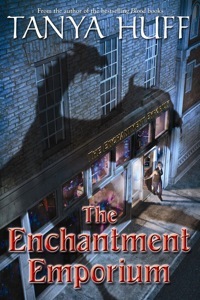 The Enchantment Emporium is the first volume in what I find myself hoping will become an extended series centered on the Gale family; in this installment, the center is Alysha Catherine Gale, 24, newly unemployed, and back home at the Gale . . . well, call it a compound — or a village, if you prefer — in semi-rural Ontario. It’s coming on May Day, and the Aunties are all baking pies in preparation for the ritual, when the news comes that Allie’s Gran is dead, by way of a letter from Gran herself. She’s left Allie her business in Calgary — a small business, she writes, that has become crucial to the local community.
The Enchantment Emporium is the first volume in what I find myself hoping will become an extended series centered on the Gale family; in this installment, the center is Alysha Catherine Gale, 24, newly unemployed, and back home at the Gale . . . well, call it a compound — or a village, if you prefer — in semi-rural Ontario. It’s coming on May Day, and the Aunties are all baking pies in preparation for the ritual, when the news comes that Allie’s Gran is dead, by way of a letter from Gran herself. She’s left Allie her business in Calgary — a small business, she writes, that has become crucial to the local community.
It’s not until Allie gets to Calgary that she begins to realize just what community Gran means. And it’s in Calgary that things start to get really weird.
Full disclosure: I really, really like books built on inference, hints, and casual references to things we may not always have a full picture of — yet. I think one reason I’ve found Huff’s contemporary fantasies so rewarding has been that her characters have a set of assumptions that are just that, as far as the story is concerned: Huff doesn’t explain a lot, she just lets it develop, giving us enough hints along they way that we can fill in the blanks as we go, on a “need to know” basis. In the case of The Enchantment Emporium, the whole milieu is built that way. The Gales are, to put it mildly, an exceptional family — one might call them “witches,” but that would be saying too little. The powers-that-be are the Aunties, the older Gale women who pretty much run things. The Gale men, and the older boys, are power centers, anchors for the others, who tend to show antlers during particularly important times of the year, which tend to correspond to the old Pagan Sabbats; the older men, such as Allie’s grandfather, spend most of their time as stags, returning to human form sometimes with great difficulty. Their interactions with the outside world are governed by one rule: if it doesn’t affect the family, it’s not their business.
The story itself is multi-layered and twisty enough to keep the reader engaged — there are several elements here that seem to be entirely unrelated, but we know better, or should. The fun is in the way Huff brings them together.
I have to confess that for the first few pages, I was afraid that Huff’s style had turned into shtick, but she’s pulled it off again — the story is a little deeper, a little more complex, pacing is perfectly apt, the characters are more fully rounded, the dialogue is still sharp, and it all fits together without a seam.
(Daw Books, 2009)
